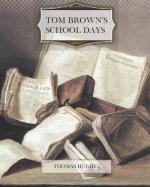Tom finds a difficulty in jumping, or indeed in finding the top of the wheel with his feet, which may be in the next world for all he feels; so the guard picks him off the coach top, and sets him on his legs, and they stump off into the bar, and join the coachman and the other outside passengers.
Here a fresh-looking barmaid serves them each with a glass of early purl as they stand before the fire, coachman and guard exchanging business remarks. The purl warms the cockles of Tom’s heart, and makes him cough.
“Rare tackle that, sir, of a cold morning,” says the coachman, smiling. “Time’s up.” They are out again and up; coachee the last, gathering the reins into his hands and talking to Jem the hostler about the mare’s shoulder, and then swinging himself up on to the box—the horses dashing off in a canter before he falls into his seat. Toot-toot-tootle-too goes the horn, and away they are again, five-and-thirty miles on their road (nearly half-way to Rugby, thinks Tom), and the prospect of breakfast at the end of the stage.
And now they begin to see, and the early life of the country-side comes out—a market cart or two; men in smock-frocks going to their work, pipe in mouth, a whiff of which is no bad smell this bright morning. The sun gets up, and the mist shines like silver gauze. They pass the hounds jogging along to a distant meet, at the heels of the huntsman’s back, whose face is about the colour of the tails of his old pink, as he exchanges greetings with coachman and guard. Now they pull up at a lodge, and take on board a well-muffled-up sportsman, with his gun-case and carpet-bag, An early up-coach meets them, and the coachmen gather up their horses, and pass one another with the accustomed lift of the elbow, each team doing eleven miles an hour, with a mile to spare behind if necessary. And here comes breakfast.
“Twenty minutes here, gentlemen,” says the coachman, as they pull up at half-past seven at the inn-door.
Have we not endured nobly this morning? and is not this a worthy reward for much endurance? There is the low, dark wainscoted room hung with sporting prints; the hat-stand (with a whip or two standing up in it belonging to bagmen who are still snug in bed) by the door; the blazing fire, with the quaint old glass over the mantelpiece, in which is stuck a large card with the list of the meets for the week of the county hounds; the table covered with the whitest of cloths and of china, and bearing a pigeon-pie, ham, round of cold boiled beef cut from a mammoth ox, and the great loaf of household bread on a wooden trencher. And here comes in the stout head waiter, puffing under a tray of hot viands—kidneys and a steak, transparent rashers and poached eggs, buttered toast and muffins, coffee and tea, all smoking hot. The table can never hold it all. The cold meats are removed to the sideboard—they were only put on for show and to give us an appetite. And now fall on, gentlemen all. It is a well-known sporting-house, and the breakfasts are famous. Two or three men in pink, on their way to the meet, drop in, and are very jovial and sharp-set, as indeed we all are.




